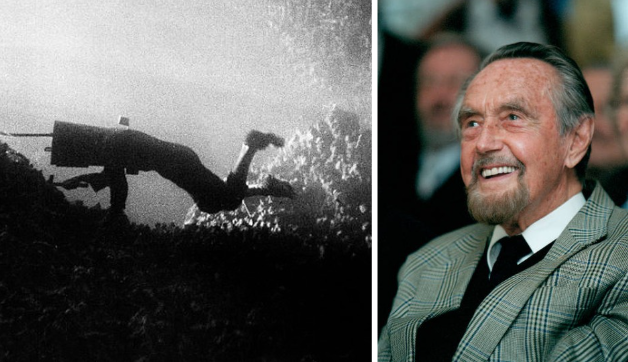From Nature to Science Hans Haas and the Austrian Biological Legacy

In the rich tapestry of scientific exploration, few names stand out like Hans Haas, a pioneering Austrian biologist whose work continues to inspire generations. Known for his contributions to marine biology, education, and underwater exploration, Haas bridged the gap between nature and science in a way that was revolutionary for his time.
Quick Bio
| Full Name | Hans Hass |
|---|---|
| Date of Birth | January 23, 1919 |
| Place of Birth | Vienna, Austria |
| Date of Death | June 16, 2013 |
| Nationality | Austrian |
| Profession | Biologist, Diving Pioneer, Filmmaker |
| Known For | Underwater Biology & Oceanography |
| Major Works | “Men and Sharks”, “Diving to Adventure” |
| Spouse | [Insert] |
| Awards | UNESCO Prize for Science (1979) |
| Fields of Study | Marine Biology, Zoology, Physiology |
Early Life and Education of Hans Haas

Born in Vienna, Austria, Hans Haas was fascinated by the natural world from an early age. His passion for biology blossomed during his school years, where he developed a keen interest in the life forms beneath the sea. After completing high school, he pursued zoology and biology at the University of Vienna. It was during this time that he made his first ventures into scientific diving, exploring underwater habitats that few had ever seen.
Initial Interest in Marine Biology

Hans Haas’s attraction to the marine world began with his early dives in the Mediterranean. These dives, often made with primitive gear, were more than adventurous—they were transformative. At a time when the underwater world was largely unknown and untouched, Haas’s expeditions brought it to life. He studied coral reefs, marine species, and underwater ecosystems, documenting his observations meticulously. What set him apart was his commitment to making marine biology accessible to the general public. Through articles and lectures, he began to share his passion, paving the way for a broader appreciation of ocean life and inspiring many to follow in his footsteps.
Pioneering Work in Underwater Filmmaking
Before Jacques Cousteau popularized underwater documentaries, Hans Haas was already breaking ground. In the 1930s and 40s, he began creating underwater films that blended scientific insight with captivating storytelling. His films, like “Menschen unter Haien” (Men and Sharks), combined biology, ecology, and adventure in a way that mesmerized audiences. These productions weren’t just educational—they were revolutionary. Using specially designed underwater cameras, Haas documented marine life in ways never before seen. His work helped to shape the early genre of nature documentaries and demonstrated that cinema could be a tool for science as well as entertainment.
Significant Contributions to Biology
Haas was not just a filmmaker; he was a scientist first. His studies contributed significantly to our understanding of marine animal behavior, physiology, and symbiosis. He introduced new theories about how marine organisms interact with their environment, particularly in reef systems. His research into echolocation, sensory perception, and predator-prey dynamics advanced the field of marine zoology. Moreover, Haas challenged the traditional image of sharks as mindless killers. Through both research and media, he portrayed them as complex and misunderstood animals, a viewpoint that helped reshape global attitudes toward these apex predators.
Scientific Philosophy and Ecological Thinking

Hans Haas had a forward-thinking approach to science and ecology. He viewed the Earth as a system of interconnected living organisms, a perspective similar to the later Gaia Hypothesis. Long before the term “ecology” was mainstream, Haas advocated for sustainable interaction with nature. He believed that scientific knowledge should serve both humanity and the environment, not exploit it. This ethical stance permeated his work and his lectures, many of which centered on preservation and respect for marine ecosystems. His ecological thinking was holistic, integrating biology, philosophy, and human responsibility.
Publications and Popular Works
Hans Haas was a prolific author, writing both scientific papers and books for general audiences. Some of his most impactful titles include “Diving to Adventure”, “Men and Sharks”, and “Under the Red Sea”. These works combined scientific observation with vivid narrative, making them accessible and engaging. His books were translated into multiple languages and reached an international audience. Through writing, Haas extended his impact far beyond academic circles, influencing public perception of the oceans and promoting a deeper respect for nature’s complexity.
Recognition and Awards
The scientific community and general public alike recognized Hans Haas for his groundbreaking work. He received numerous awards, including the UNESCO Prize for Science in 1979, which acknowledged his lifelong commitment to scientific discovery and education. He was also honored by environmental organizations, diving federations, and academic institutions. These accolades not only celebrated his past achievements but also validated the importance of integrating fieldwork, innovation, and public outreach in modern science.
Haas’s Role in Austrian Scientific Heritage
As an Austrian scientist, Hans Haas holds a special place in the country’s scientific legacy. Austria, known more for classical music and architecture, also boasts a proud history in natural sciences. Haas brought global attention to Austrian marine biology, often representing his homeland in international symposia and media. He helped establish marine biology as a serious academic discipline within Austria and encouraged young scientists to look beyond traditional laboratory settings into nature’s vast living laboratory—the ocean.
Legacy in Modern Marine Biology
Many of the methods and philosophies introduced by Haas are still in use today. From underwater photography to non-invasive research techniques, his innovations paved the way for modern marine biology. His belief in immersive, respectful exploration is echoed in today’s conservation-centered science. Modern marine institutes continue to draw on his works as foundational texts, and his influence can be seen in both academic curriculums and environmental policies worldwide.
Impact on Ocean Conservation
Hans Haas was among the earliest voices warning about ocean degradation, overfishing, and reef destruction. Long before it became a global issue, he advocated for marine conservation. His films and books often included messages about the importance of protecting underwater ecosystems. He saw the ocean not as a resource to be exploited but as a living system to be understood and preserved. His pioneering views helped inspire the modern marine conservation movement, influencing both policy and public consciousness.
Death and Commemoration
Hans Haas passed away on June 16, 2013, at the age of 94. His death marked the end of a remarkable era, but his legacy lives on. Memorials, marine exhibits, and retrospectives of his work continue to honor his contributions. Many marine research institutions have named programs and fellowships in his memory, ensuring that his passion for the ocean continues to inspire future scientists.
Conclusion
In the intersection of science, exploration, and media, Hans Haas stands as a timeless figure. His legacy is not just preserved in his books and films but in the very spirit of modern marine biology and conservation. He taught the world to look beneath the surface—not just of the ocean, but of assumptions, fears, and outdated scientific practices. As science continues to evolve, the life and work of Hans Haas remain a guiding light for those who seek to understand and protect the natural world.
FAQs
Who was Hans Haas?
Hans Haas was an Austrian biologist, marine explorer, and filmmaker known for pioneering underwater research and marine conservation.
What is Hans Haas best known for?
He is best known for his underwater documentaries, marine biology research, and changing public perceptions of sharks and marine ecosystems.
What were Hans Haas’s major contributions?
He contributed to marine biology, underwater filmmaking, ocean conservation, and helped establish ecological thinking in Austria.
Did Hans Haas work alone?
No, he collaborated closely with his wife Lotte Hass, who was also a pioneer in underwater exploration.
How did Hans Haas influence marine biology?
He developed new underwater filming techniques and promoted hands-on, immersive marine research, influencing modern research methods.
What awards did Hans Haas receive?
He received the UNESCO Prize for Science in 1979 and several other honors recognizing his scientific and media contributions.
Is Hans Haas still remembered today?
Yes, his work is celebrated globally in marine biology circles, and many institutions continue to honor his contributions.
What books did Hans Haas write?
His notable works include Men and Sharks, Diving to Adventure, and Under the Red Sea.
Was Hans Haas involved in conservation?
Yes, he was an early advocate for marine conservation and emphasized sustainable interaction with ocean ecosystems.
How did Hans Haas die?
He passed away peacefully on June 16, 2013, leaving behind a rich legacy of scientific and ecological contributions.
For More Updates Visit: Fortune Magazine




